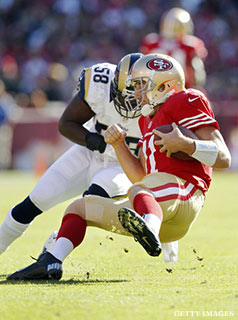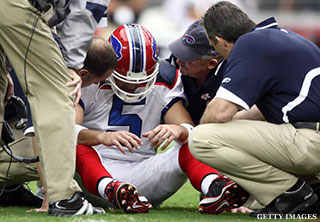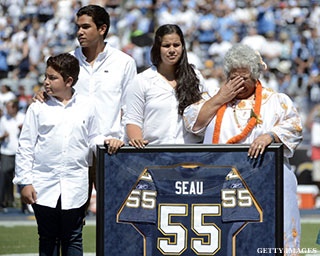![]()
During the 2012-13 NFL season, 170 players were sidelined with head injuries. One of those forced to sit out was San Francisco 49ers quarterback Alex Smith. Off to the best start of his career, the former No. 1 overall pick lost his starting gig and is now a Kansas City Chief because of a single concussion.

While so many of his cotemporaries play through head injuries, Smith went against the grain by speaking up. It is a decision that has changed the whole course of his career. "I feel like the only thing I did to lose my job was get a concussion” Smith said in November. In a day and age where everyone from football players to the president has weighed in on the issue of concussions, Smith's story intensifies the debate.
Although he many not realize it now, Smith’s choice to report his concussion may have been the best thing he could have ever done. By giving his brain the proper time to heal, Smith has a greater chance of avoiding the lifestyle that some, like former Yale football player Chris Coyne, have endured.
A star player and all-state standout from Staples High School in Westport, Conn., Coyne suffered six concussions during his football career and still feels the effects of his decisions today.
"Its been a year and a half since my last concussion and I still can't take notes in class," Coyne said. "I still need Ritalin to concentrate and still need extra time on every test I take."
Coyne realizes that he has nobody to blame but himself and regrets not reporting his first concussion. While the former tight end took several major blows to the head, it is unclear which hit had the biggest impact. "We still don't know whether a few colossal blows to the head are worse than the cumulative effect of hundreds or thousands of hits," said Dr. John Hart Jr., medical science director at the Center for Brain Health in Dallas.
Hart is at the forefront of concussion research and has examined more than 50 retired NFL players during the past three years. According to the research released from Hart’s study, 40 percent of the retired players inspected have some form of cognitive impairment. In fact, three-fourths of the ex-players examined didn’t associate their brain issues with football, nor did they realize their condition was treatable.

Twelve-year NFL veteran Daryl Johnston was one of the first players checked out by the Center for Brain Health three years ago. The former Dallas Cowboys fullback knows of two concussions that he had during his professional football career. A two-time Pro Bowler, Johnston believes that the retired community needs to be more proactive with its brain health.
“I have reached out to several guys to get a baseline," Johnston said. "That was the most important thing for me. My son got his first baseline in fifth grade. I didn't get mine until I was 44."
While Johnston's cognitive tests came back favorably, the Fox Sports analyst still worries about his long term health, especially after the shocking suicide of San Diego Chargers linebacker Junior Seau in 2012. Although Seau was never diagnosed with a concussion during his 19-year career, doctors discovered Chronic Traumatic Encephalopathy (CTE) in his brain.
CTE is triggered by repeated head trauma and can only be confirmed after death. Thirty-four former NFL players have been diagnosed with this disease, including former Chicago Bears defensive back Dave Duerson. The two-time Super Bowl champ shot himself in the chest in February 2011, leaving a note behind demanding his brain be donated to research.

While the deaths of Seau and Duerson demonstrate the connection between football and depression, time on the gridiron is not the only reason for this cognitive illness. Dr. Mitchell Berger of the Neurology Department at the University of California San Francisco points to other causes that could have contributed to death by depression.
"When associating depression with someone who has played football, it is important to also analyze the socioeconomic, family and work factors involved," Dr. Berger said.
This will be a major focus of the lawsuit between Seau's family and the NFL. With more than 4,000 players teaming up to sue the league for hiding information about long term risks of head injuries, the next few months will most certainly intensify the debate surrounding concussions.
Regardless of the result, Coyne's story reminds us of something far more important than a courtroom victory: the importance of revealing head injuries.
“I want to keep kids from making the same mistakes that I did," Coyne said. "If I had reported my concussions and taken the time to heal properly, I believe I would still be playing football today."
If you think you have suffered a concussion, follow these steps:
1. Make an appointment with your doctor or a team trainer. Don't be afraid of what others will think if you report a head injury. Better safe than sorry.
2. Once diagnosed with a concussion, avoid any activity involving a screen and/or bright light (ex: watching TV, using a computer, tablet or cell phone). The key to recovery is resting in a dark room with little light and few distractions.
3. The websites for USA Football and the NCAA offer great information on concussion awareness.




